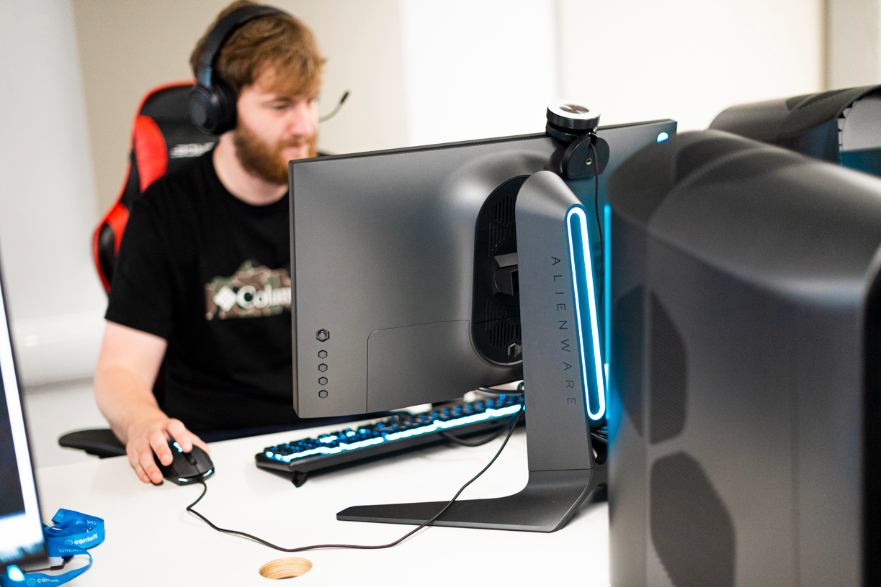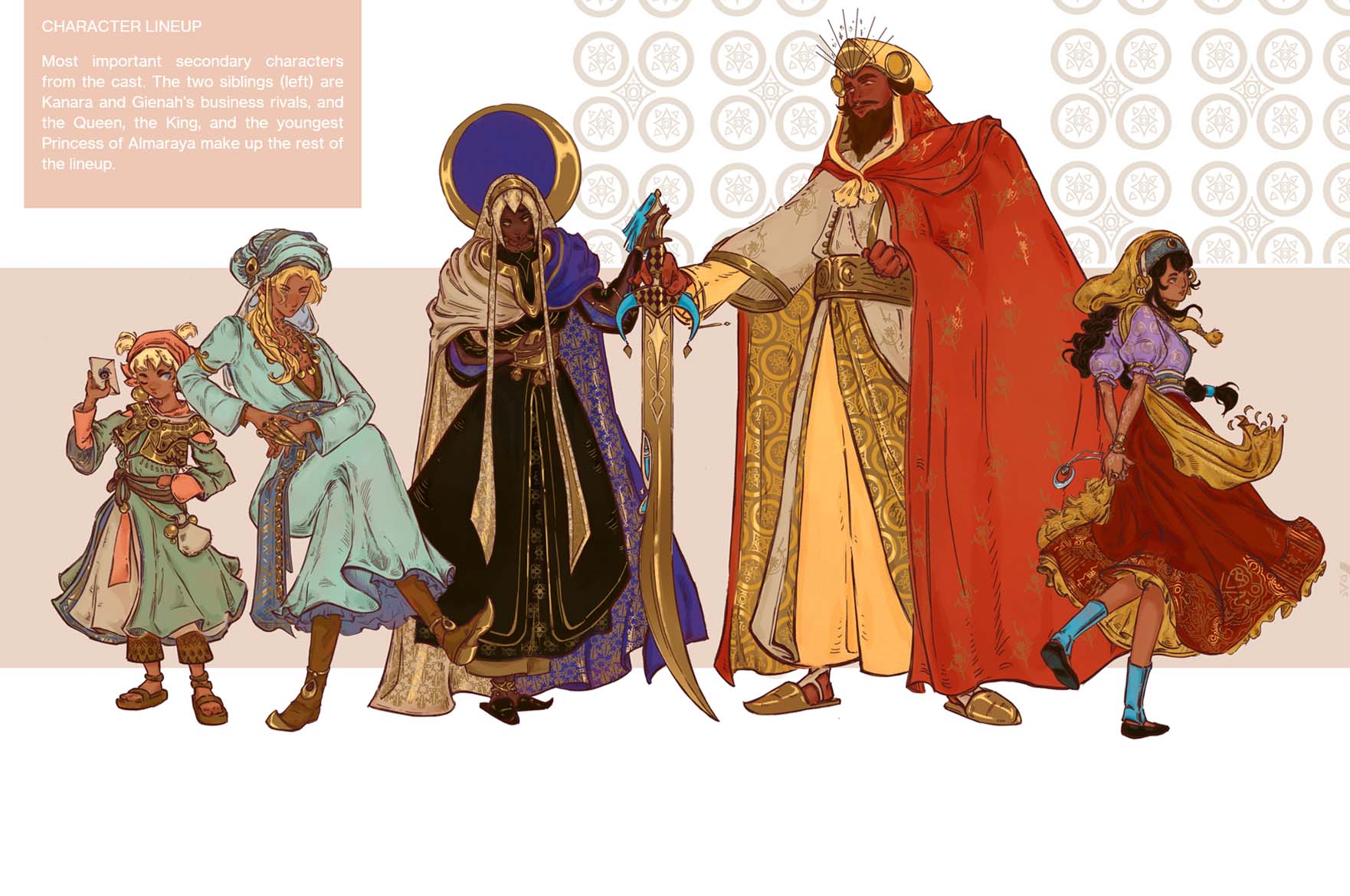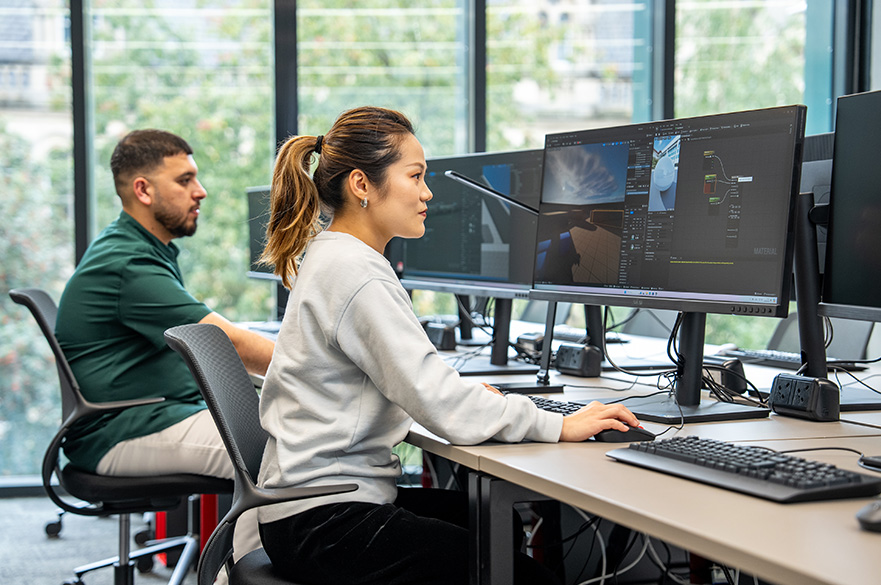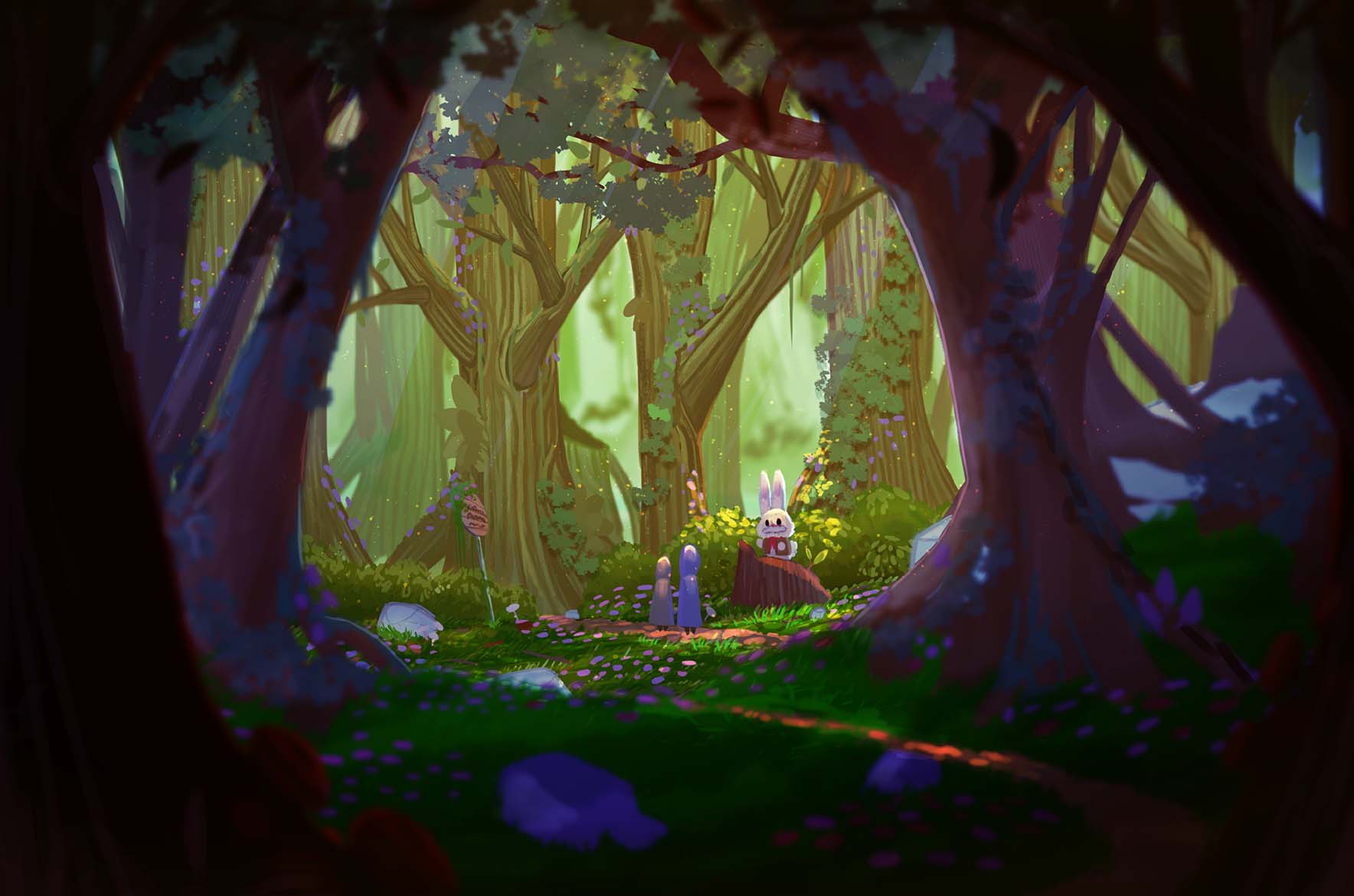This course is in Clearing
Offers from 48 tariff points
About this course
This Games Art foundation degree, based in Nottingham, is designed for those who want a career in the growing games art industry.
The game artist creates the visual elements of an interactive computer game, crafting assets like 2D graphics, 3D characters and environment models, surface textures and user interface components.
A game artist may also be involved in conceptualising ideas to help communicate the proposed visual elements during the pre-production phase. This Games Art degree will give you the opportunity to experience a range of techniques and software used in the games industry, whilst developing specialist skills to support career goals within your chosen art role.
15
What you’ll study
This Games Art foundation degree is designed for those who want a career in the growing games art industry. The game artist creates the visual elements of an interactive computer game, crafting assets like 2D graphics, 3D characters and environment models, surface textures and user interface components.
A game artist may also be involved in conceptualising ideas to help communicate the proposed visual elements during the pre-production phase. This game art degree will give you the opportunity to experience a range of techniques and software used in the games industry, whilst developing specialist skills to support career goals within your chosen art role.
Designing a game world (20 credit points)
This module will allow you to learn and develop the skills required to imagine and visualise imaginary worlds and the characters and assets within them, representing them with verisimilitude. You will develop concept art skills in order to explore ideas and produce client ready speculative art.
Building a game world (20 Credit Points)
This module will teach you how to explore 2D and 3D solutions to environment design and apply technical knowledge to these tasks. You will develop your concept art skills in order to explore ideas and produce client ready speculative art. You will also enhance your 3D repertoire to develop your concept and ideas as fully realised 3D Levels. This module will also include written elements in the form of media reviews (prose and moving image) as well as artist reviews.
Industry Collaboration: Pre-Production (20 Credit Points)
This module challenges students to pre-produce your first AWLE Project. Taking a brief from client to final presentation encourages you to engage with an ambitious creative pipeline, creating and developing final designs for characters and assets for an existing IP.
Industry Collaboration: Production (20 Credit Points)
This module challenges you to produce your first AWLE Project. Taking a brief from client to final presentation encourages you to engage with an ambitious creative pipeline. Building on the work completed in the Pre-Production module, you will now use industry-standard software to finalise your designs to present to clients.
Games artist toolkit (20 Credit Points)
This module comprises two elements – Life Drawing and 3D Software. Together, they enhance and expand upon core skillsets fundamental to the origination and execution of engaging computer-generated imagery. Drawing introduces approaches to studies in drawing central to the enterprise of visual expression with an emphasis on life drawing.
Critical & contextual studies (20 Credit Points)
This module introduces you to theoretical frameworks through which to consider, contextualise and challenge your creative practice. Understanding the historical, cultural and theoretical context in which computer-generated imagery situates is crucial to broadening perspectives and enriching your abilities to discuss, develop and disseminate your ideas with confidence.
Building Alliances (40 Credit Points)
Experience of collaboration is a key expectation of students of Games Design. This unit challenges you to engage in teamwork in the pre-production, production and promotion of an Game Concept. You are required to identify your strengths as they align with specific studio roles; for example, concept artist, production designer, character designer, pre-visualiser, modeller, texture artist, sculptor etc.
Real Worlds (40 Credit Points)
This module challenges you to pre-produce and produce your second AWLE Project. Taking a brief from client to final presentation encourages you to engage with an ambitious creative pipeline.
Games Artist Toolkit (20 Credit Points)
This module comprises two elements – Character Design and 3D Software. Together, they enhance and expand upon core skillsets fundamental to the origination and execution of engaging computer-generated imagery.
Industry Practice (20 credit points)
During this module you will undertake an overarching, self-directed game development project, working both individually and collaboratively on creative work - allowing you to directly apply the research, knowledge and skills learnt throughout the programme in the context of the workplace.
This module aims to develop overall professionalism and provide the knowledge and resources to begin a career in the creative industries. This module aims to develop these skills and knowledge by challenging you to develop a range of self-directed projects along with analysis of the processes involved along the way.
We regularly review and update our course content based on student and employer feedback, ensuring that all of our courses remain current and relevant. This may result in changes to module content or module availability in future years.
How you're taught
Teaching and learning experiences will include:
- lectures
- seminars
- workshops
- group tutorials
- personal tutorials
- presentations and pitches
- teamworking
- independent learning
- visiting industry professionals.
Showcase
You will be given the opportunity to exhibit your work during your time at NTU to members of the creative industries.
How you're assessed
Forms of assessment include:
- practical assessments
- portfolio building
- case studies
- lab report
- reflective journals
- formal essay
- presentations.
Careers and employability
After completing your foundation degree, you’ll have the chance to top up to BA (Hons) Games Art or go straight into industry.
Students who complete the programme can progress to relevant employment, self-employment or to further study. Graduates of this course can apply their expertise in vocational areas such as:
- games artist
- concept artist
- lead artist
- 3D modeller
- character artist
- 2D artist
- technical artist
- texture artist
- UI artist
- environment artist
- storyboard artist
- games designer
- graphic designer for games.
Connecting with industry
Industry professionals visit the course to guest lecture and share their experiences. You will also attend workshops from industry professionals working in art roles for both AAA and independent markets, giving you the opportunity to make contacts and build your portfolio and CV.
Work placement and internship opportunities
One of the features of this course is the strong opportunity for work-based learning that is embedded into the curriculum.
You will be provided with the opportunity to work in partnership with local, national and sometimes international games developers and related creative media industries. Current and on-going industry links and module leaders will provide ample opportunities for a regular guest speaker programme from a variety of organisation within the games industry.
YouFirst – working with our Employability Team
Studying a degree at a popular university has many benefits, none more so than having access to a large employability team.
Our friendly, experienced careers consultants will work closely with you at every stage of your career planning, providing personal support and advice you won't find in a book or on the internet. You can benefit from this at any time during your studies and up to three years after completing your course.
Campus and facilities
On this course you’ll study across various facilities located on our City Campus.
You'll have access to:
- Industry Spec Workstation PC’s
- Unreal Engine 5
- Autodesk Suite (3DS Max, Autodesk Maya, Mudbox)
- Adobe Creative Suite, Photoshop
- Z-Brush
- Quixel 2.0
- Unreal Engine 5
- Wacom Cintiq 13HD Touch Tablets
- Wacom Cintiq Pro16: Creative Pen Display
- Games Consoles
- Substance Painter
Entry requirements
This course is in Clearing
Looking for a place in Clearing? We are accepting application and would love to hear from you!
UK students
This course is in Clearing
Looking for a place in Clearing? We are accepting applications and would love to hear from you!
Clearing requirements
From 48 UCAS tariff points from up to qualifications.
To discuss our entry requirements and see what we can offer you, call us now on +44 (0)115 848 6000. Alternatively, if you already have your qualifications, apply online via our Clearing Application form.
Preparing for results day? Beat the queue and sign up for NTU Priority for up-to-date information about all things Clearing. You’ll get an offer ahead of Clearing, subject to you achieving the required grades on results day.
Additional requirements for UK students
There are no additional requirements for this course.
Other qualifications and experience
NTU welcomes applications from students with non-standard qualifications and learning backgrounds, either for year one entry or for advanced standing beyond the start of a course into year 2 or beyond.
We consider study and/or credit achieved from a similar course at another institution (otherwise known as credit transfer), vocational and professional qualifications, and broader work or life experience.
Our Recognition of Prior Learning and Credit Transfer Policy outlines the process and options available for this route. If you wish to apply via Recognition of Prior Learning, please contact the central Admissions and Enquiries Team who will be able to support you through the process.
Getting in touch
If you need more help or information, get in touch through our enquiry form.
International students
This course is in Clearing
Looking for a place in Clearing? We are accepting applications and would love to hear from you!
Clearing requirements
From 48 UCAS tariff points from up to qualifications.
To discuss our entry requirements and see what we can offer you, call us now on +44 (0)115 848 6000. Alternatively, if you already have your qualifications, apply online via our Clearing Application form.
Preparing for results day? Beat the queue and sign up for NTU Priority for up-to-date information about all things Clearing. You’ll get an offer ahead of Clearing, subject to you achieving the required grades on results day.
This course is not suitable for International applicants.
Additional requirements for international students
There are no additional requirements for this course.
English language requirements
View our English language requirements for all courses, including alternative English language tests and country qualifications accepted by the University.
If you need help achieving the language requirements, we offer a Pre-Sessional English for Academic Purposes course on our City campus which is an intensive preparation course for academic study at NTU.
Other qualifications and experience
If you have the right level of qualifications, you may be able to start your Bachelors degree at NTU in year 2 or year 3. This is called ‘advanced standing’ entry and is decided on a case-by case basis after our assessment of your qualifications and experience.
You can view our Recognition of Prior Learning and Credit Transfer Policy which outlines the process and options available, such as recognising experiential learning and credit transfer.
Sign up for emails
Sign up to receive regular emails from the International Office. You'll hear about our news, scholarships and any upcoming events in your country with our expert regional teams.
Getting in touch
If you need advice about studying at NTU as an international student or how to apply, our international webpages are a great place to start. If you have any questions about your study options, your international qualifications, experience, grades or other results, please get in touch through our enquiry form. Our international teams are highly experienced in answering queries from students all over the world.
Policies
We strive to make our admissions procedures as fair and clear as possible. To find out more about how we make offers, visit our admissions policies page.










